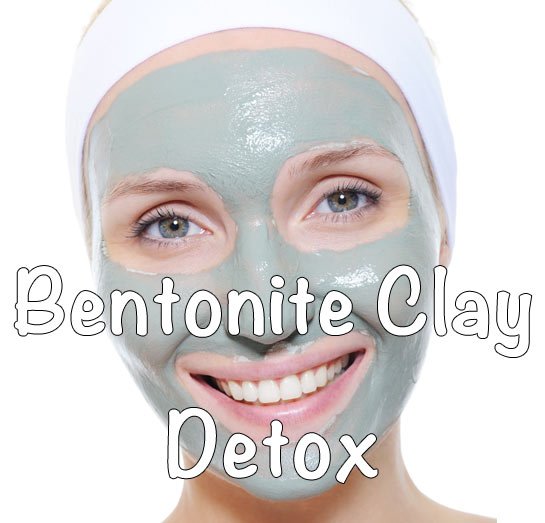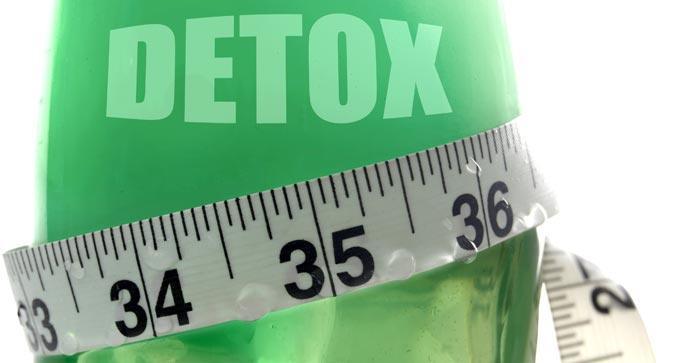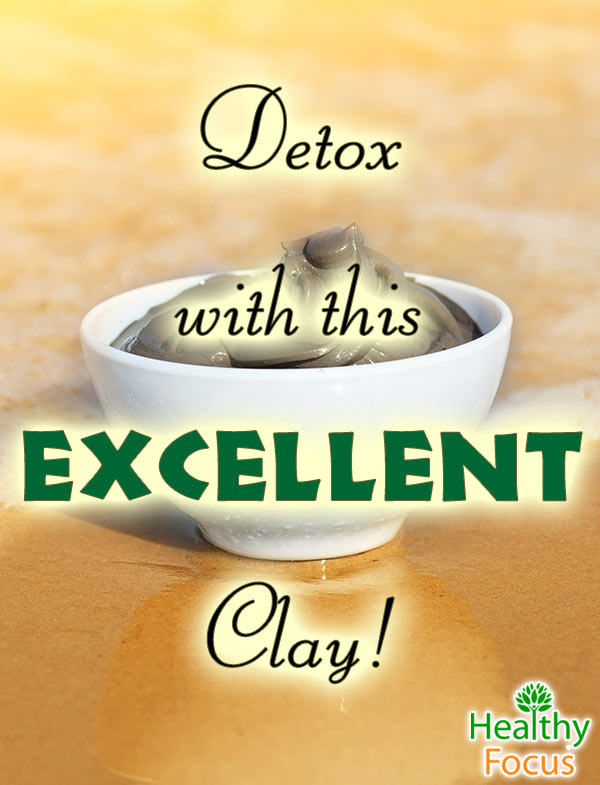Last Updated on July 10, 2018 by Marc Seward

When you think of natural health and beauty ingredients, the first things you probably picture are herbs and natural oils. While these are certainly the most popular substances used in today’s naturally-derived products in the health and beauty industries, there are plenty of other natural substances that can be just as powerfully beneficial as those.
In fact, almost every part of our planet, to some extent, can be used as a natural replacement for many man-made products or treatments, providing even more benefits than you could imagine. By opening your mind to the different types of substances that are out there, you can start your journey to refreshing your body’s health and living a better, longer life.
Clay is typically thought of like dirt, but even these substances can be very powerful when added to different health and beauty products or practices. It may seem strange, but healing clays have actually been used since ancient times in traditional medicinal and beauty practices.
Even animals know how beneficial clay and dirt can be, as some eat it for the purpose of removing toxins from their systems. People may think that clay is only good for mud masks and skin care, but you may be surprised by just how many benefits different types of natural clay can provide.
So if you are looking for a natural way to detox yourself inside and out? Sodium Bentonite clay may be just what you are looking for. Bentonite clay draws out the toxins, heavy metals, chemicals, and impurities from your body, purifying your systems and enhancing your overall health.
The cells in our body create waste material, which can become poisonous or toxic if it is not filtered out quick enough. This toxic buildup within the body can lead to such symptoms as aching or stiff joints, digestive issues, bloating or gas, acid reflux, problems with the colon, mental dullness, and fatigue. For centuries clay has been known for its healing properties due to its high negative ionic charge and its alkaline pH.
What is Bentonite Clay?
Even though you might not have ever heard of it, Bentonite or Montmorillonite clay is one of the most powerful clays that we have access to today. The clay is made from ash produced by volcanoes. While the specific volcano is not important, there is a collection of volcanoes found in Fort Benton, Wyoming that seem to be the current largest source of this clay today.
While many natural substances are named for reasons that are typically scientific, both names used to refer to Bentonite clay are actually derived from certain places. Bentonite is the name of the town that harvests the largest supply of the clay.
It may also be called Montmorillonite clay, which refers to the region of France where the clay was originally discovered. Either name can be used to refer to the clay today.
Since ancient times, Bentonite clay has been used for many healing and cosmetic purposes. Scientists have reported that cultures in areas of Central Africa, Australia, and the Andes have been using Bentonite both externally and internally for many centuries. Its simple and easy processing requirements make it a very widely available and cost-effective treatment, especially for the purpose of “detoxing.”
Using this clay for a detox is like connecting with the Earth. Unfired clay such as bentonite clay is often referred to as “living earth” due to its electromagnetic charge. When mixed with water, this clay, made of volcanic ash expands like a porous sponge.
How Does Bentonite Clay Work?
When mixed with water, Bentonite clay actually produces an electrical charge, which makes this clay very unique in that way. This electrical charge allows the clay to absorb toxins, heavy metals, chemicals, and other impurities or foreign compounds.
The toxins lurking in your body are then drawn out via electrical charge and bound. Bentonite clay hosts a negative charge, which bonds to the positive charge of toxins. Once the toxins, heavy metals, and chemicals are bound, the expansive clay absorbs the toxin and holds onto it until it is flushed out of the digestive tract.
Toxins that are drawn out by bentonite clay are pesticides, herbicides, heavy metals, pathogenic viruses, and radioactive substances. This healing clay actively filters out toxins before they reach the bloodstream, giving your liver and kidneys a helping hand. Bentonite clay is also beneficial to your cells. This clay oxygenates cells and pulls out the excess hydrogen, replacing it with oxygen instead.
What are the Benefits of Bentonite Clay?
Bentonite clay and its absorption abilities provide powerful health benefits that can be applied to many different circumstances. Its most common use is in facial masks, due to its ability to absorb and remove impurities and toxins from the skin, which can help stop outbreaks and reduce the appearance of blemishes and redness.
The clay also has powerful antibiotic properties that can help treat skin infections like dermatitis. Other skin benefits include treating poison ivy, allergic reactions, and healing Buruli ulcers (an infection caused by Mycobacterium ulcerans).
Although Bentonite clay is most commonly used externally for skin treatments, it can also provide significant health benefits when ingested for the purpose of internal treatments. The clay can remove toxins from the gut to improve digestive health.
Animal studies have shown that the clay also removes aflatoxins that, in large amounts, can cause liver damage and increase the risk of some types of cancer. Its work in the gut can also help treat viruses that cause the stomach flu.
Some studies have shown that the clay may also be beneficial in promoting healthy weight loss and balancing cholesterol levels. With that said, these studies have not proven that Bentonite clay itself was the reason for the weight loss, as it was included in a healthy diet with other ingredients and substances that could have done the same.
A study performed on rats in 2016, however, did show results that supported the findings of the original study.
Bentonite clay can also be beneficial in treating thyroid conditions like hyperthyroidism, fighting certain types of cancerous cells, boosting the immune system, and supporting better respiratory health.
The clay can also help improve dental and gum health by detoxifying the mouth. In addition, it can assist in removing fluoride from water. This can help prevent many conditions often associated with fluorides such as diabetes, brain damage, and thyroid issues.
Below are some of the specifics of benefits you may experience while using the bentonite clay detox.
Environmental Toxins
Is your environment making you sick? Possibly. Unfortunately, it is hard to escape the toxins infiltrating our homes, such as paint, cleaning supplies, permanent markers, pesticides, building materials, etc. It appears anything can damage our delicate health. Bentonite clay has been shown to absorb these toxins from the body, reducing exposure and damage from these dangerous compounds.
Heavy Metals
You may not realize it, but your body is absorbing harmful heavy metals all the time. Mercury, lead, cadmium, and benzene compounds are abundant in our environment and even in our food.
These dangerous metals can often be found in building materials, fish, foods with high fructose corn syrup, and even our drinking water. Bentonite clay cleanses the body of these heavy metals, reducing their damaging effects.

Detox
First and foremost, bentonite clay is a detoxifier. As mentioned above, this clay pulls heavy metals, radioactive material, and toxins out of your body and is swiftly flushed out of your digestive system.
Listed below are some of the harmful toxins that bentonite clay removes from your system:
Contaminated Soil
Absorbent soil may contain lots of toxins and dangerous compounds. Particularly soil near busy roads or highways, which may contain a wide range of pollutants, heavy metals, and toxic chemicals.
These toxins could be building up for decades and may interfere with the quality and production of crops. Such carcinogens such as toluene, xylene, and benzene have been found in contaminated soil and are detrimental to your health. Bentonite clay may be beneficial in inhibiting the harmful contaminants in the soil.
Fluoride
There has been a rising concern over the fluoride content in our drinking water. Fortunately, there may be a solution. A recent study found that when combined with magnesium chloride, bentonite clay reduced the fluoride content in fluoridated water. Experts hope that this will lead to a better water filtration technique in the future to ensure the safety of the water coming out of our taps.
Dietary Toxins
Unbeknownst to us, there are lots of toxins lurking in our food. For example, a mold-like toxin such as aflatoxin is found in numerous crops. Aflatoxin can have a negative effect on the liver, damaging it or making it more susceptible to cancer.
Aflatoxin also interferes with the functioning of the immune system, making your more vulnerable to infection. Studies have shown that by detoxing with bentonite clay, you can reduce the damage caused by these dietary toxins.

Boosts Immune System
Due to its detoxifying effects, bentonite clay is known to support the immune system. This natural clay protects against harmful toxins and reduces exposure and resulting damage.
Oxygenates Cells
Bentonite clay is great for your cellular health. This earthy clay helps get oxygen to cells and pulls out excess hydrogen. When your cells are properly oxygenated, your body is better able to repair itself from illness and workouts. Many people feel more energized.
Removes Toxins Topically
When added to a bath, bentonite clay can absorb toxins out of your body through the skin. The toxins are bound and drawn out, leaving your feel revitalized. By soaking in a clay bath, your skin is left feeling hydrated and smooth. Inflammatory skin conditions may also subside.
Candida
Bentonite can be used as part of a Candida cleanse. Bentonite mixed with Psyllium Husk or another fiber can help during a colon cleanse. Bentonite should absorb Candida and help flush it out of your intestines.
Inflammatory Skin Conditions
Bentonite clay, when mixed with water and used as a mask, can remove harmful toxins from your skin. This mask draws out impurities, toxins, and bacteria from your pores and is flushed away once you rinse with water.
This helps reduce blemishes, acne outbreaks, allergic reactions, and possibly even poison ivy. Due to its antibiotic properties, this clay may also speed up the healing time of wounds and other skin infections. Those suffering from psoriasis and dermatitis may find relief using this clay.
Digestive Problems
This healing clay eliminates harmful bacteria, kills viruses, and removes toxins distressing you’re your digestive system. Many have found that using bentonite clay alleviates digestive upset such as IBS, constipation, and vomiting in pregnant women.
While removing the harmful bacteria, bentonite clay encourages good bacteria in your gut. By encouraging the proliferation of good gut flora, your body is better able to absorb nutrients and boost your immune system.
Dental Health
Bentonite clay helps to ensure a beautiful and healthy smile. As much as we might not like to think about it, our mouths are a hotbed for bacteria and toxins. Fortunately, bentonite clay binds to these harmful toxins attacking the teeth and tongue and removes them before you swallow them.
This, in turn, boosts the overall health of your teeth and body. In fact, many natural kinds of toothpaste and mouthwashes on the market contain bentonite clay. At home, you can use bentonite clay as a health mouth rinse by mixing it with water.
How to Use Bentonite Clay?
If you’re interested in the detoxifying and health benefits of bentonite clay, there are a couple of ways you can use it. Keep in mind that bentonite clay is typically gray, odorless, and tasteless. If the powder is bright white, it may have gone bad.
Because of how versatile Bentonite clay is and the health benefits it can provide, you can use this natural substance in many different ways. Something to keep in mind, however, is that you should never let the clay come in contact with any metal material, as this could reduce the effectiveness of the clay. If you need to mix the clay with water, do so using only glass or plastic materials.
If you plan on using Bentonite clay for internal treatments, you should always speak with your doctor first to make sure it won’t interfere with any medications you may already be taking or potentially make certain health conditions worse.
When taking Bentonite clay internally, make sure to wait at least two hours after eating or taking medication to make sure that those things do not affect the clay and its benefits.
As a drink
- Mix a ½ to 1 teaspoon of clay in a jar of water.
- Put a lid on the jar and shake until the clay is fully dissolved.
- Drink this mixture right away.
Geophagy (eating “earth” particularly clay) has been done by humans for 1000’s of years—so in moderation, it is safe. Always refer to a doctor if you have specific medical conditions. Prolonged use or large doses may cause constipation.
As a rinse
- Mix some clay with water and gargle for 30 seconds to one minute as you would with a mouthwash.
- Spit out the mixture and rinse with regular water.
In your bath
- Add a ¼ cup of clay to your bathwater and allow the clay to absorb into your skin.
- Soak for as long as you like and relax.
- Rinse with clean water once you’re finished.
As a Facemask
To heal blemishes, acne flare-ups, and other inflammatory conditions. As it is primarily used in beauty products like facial masks, one of the biggest benefits of Bentonite clay is that it can help treat acne and reduce future breakouts.
When used as a wet mask on the face, the clay absorbs toxins and extra sebum out of your skin, and it also shrinks any pores that have been irritated or enlarged. Its general cleansing and detoxifying properties can also help improve the health of your skin, which reduces the likelihood of breakouts in the future.
To use Bentonite clay as an acne treatment, there are many recommendations regarding what sort of recipes and combinations you should use for the best results. Many people choose to simply use Bentonite clay alone by mixing it with water to form a paste. However, it can also be combined with other beneficial ingredients like Apple Cider Vinegar and lavender oil to help soothe the skin and provide even more benefits.
- Apply the clay directly to the affected area and allow the clay to dry for 20 minutes.
- Rinse off with water.
- For best results or to effectively fight acne, uses this clay once or twice a week.
Recipe or Bentonite Clay Mask
- 1 Tablespoon Bentonite clay
- 1 Tablespoon Apple cider vinegar
- 5 Drops of Lavender Oil
- 1 Tablespoon Baking Soda
- Add water as needed to make a spreadable paste
Side Effects and Some Considerations
Generally speaking, Bentonite clay doesn’t come with many side effects when being used as an external treatment. However, there are some things you should keep in mind before taking the clay internally, for any purpose.
The clay contains a relatively high amount of aluminum (around 15%) which may vary depending on where you purchase it. With that said, the nature of Bentonite clay prevents the aluminum from causing any negative effects on a person, and many of the clay’s health benefits actually depend on aluminum, which can also be found naturally inside our bodies.
- Before starting any detox, always consult your physician, especially if you are taking medications to make sure that it does not block their absorption.
- If you have the okay from your doctor, make sure to take your medication or vitamins two hours before or two hours after ingesting the clay.
- Those suffering from iron absorption issues should not use bentonite clay.
- Some people experience constipation while using this clay, as it pulls water from your colon. Be sure to drink plenty of water during the process. If you are still experiencing constipation, adding some fiber to your diet can get things moving right along.
- When mixing avoid touching metal containers or utensils as this may reduce effectiveness. If mixing in jars-use plastic tops or utensils to stir.
Overall, the side effects shouldn’t scare you away from using Bentonite clay, as these are primarily associated with long-term overuse of the substance. By speaking with a doctor before using Bentonite clay internally, you can reduce the risk of these negative side effects.
Consulting a holistic health practitioner can also help you determine the best dosages and frequency to follow when taking Bentonite clay internally.

Leave a Reply
You must be logged in to post a comment.